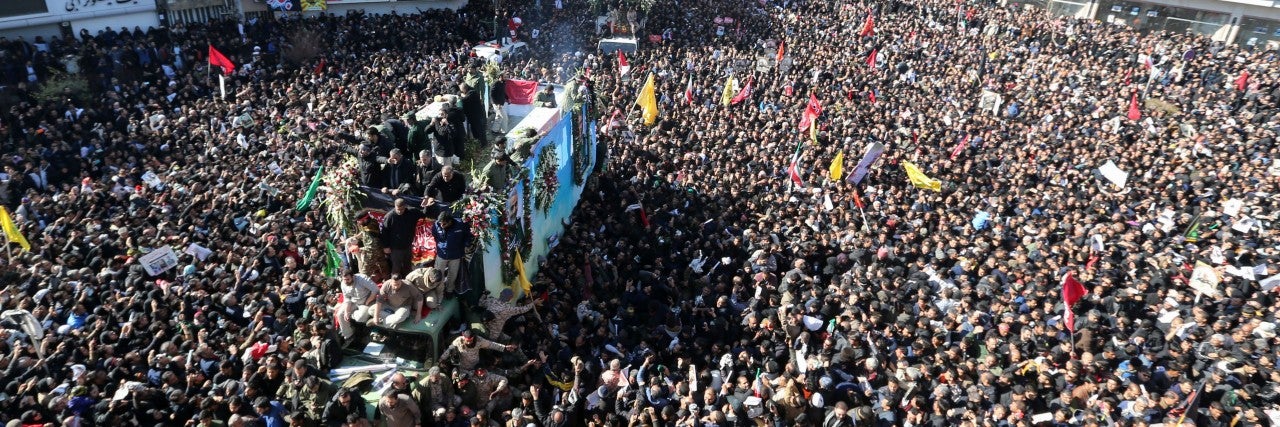January 23, 2020
On January 3, U.S. forces carried out a drone strike near Baghdad International Airport, killing Qasem Soleimani, commander of Iran’s Islamic Revolutionary Guard Corps Quds Force. Iranian-backed terrorists and the newly-appointed commander of the Quds Force swiftly vowed that they would avenge his death. Simultaneously, Iran is publicly backing away from the Joint Comprehensive Plan of Action, also known as the Iran deal, heightening concerns about its pursuit of nuclear weapons. And all the while, large-scale protests have rocked Iranian cities, giving expression to simmering popular discontent. What does all this mean for America, Israel, the Middle East, and the rest of the world? Here’s what you need to know.
1. Who was Soleimani and why is his death considered worthy of avenging?
As a commander of the Iranian Revolutionary Guard’s elite Quds Force, Major General Qasem Soleimani was feared in Iran and around the world.
“This was a man who was also a brutal thug at home as well as a terrorist abroad,” said Patrick Clawson, Research Director at the Washington Institute for Near East Policy, during an interview on People of the Pod, a podcast hosted by AJC and The Times of Israel.
Soleimani claimed credit for halting ISIS in Iran and facilitating relief when record floods hit parts of the Islamic Republic last year. He only answered to the Supreme Leader of Iran, Ali Khamenei. This means Iran’s elected regime had no control over him, Clawson said.
“The perception that it was the Revolutionary Guard, in particular, Qasem Soleimani, that saved the country, that’s what launched him on this path of being so incredibly popular,” Clawson said. “Of course, the irony is, it was the ultra-sectarian policies that Soleimani had pushed the Iraqi government to adopt that were so responsible for young Sunnis turning to ISIS as their only possible savior.”
2. How do recent proclamations by the Iranian government affect Iran’s nuclear capability?
Iran’s announcements that it would enrich uranium beyond the limits set by the 2015 Joint Comprehensive Plan of Action, or Iran nuclear agreement, indicate the regime’s intent to develop the capacity to build a nuclear weapon. A trove of Iranian documents obtained by Israeli intelligence in 2018 show Iran’s bellicose intentions are nothing new and that the JCPOA was based on Tehran’s lies regarding its past nuclear intentions.
It should come as no surprise that as soon as the U.S. bowed out of the agreement in 2018 and imposed sanctions, Tehran walked back its commitments, announcing new breaches every 60 days.
In response to Iran’s uranium enrichment announcement, Western European signatories to the nuclear deal have sought recourse through the JCPOA’s dispute resolution mechanism to bring Iran back into compliance. Otherwise, the Islamic Republic could face UN sanctions. Iran’s reaction? It threatened to withdraw from the 1970 Non-Proliferation Treaty, paving its way to a future acquisition of nuclear weapons.
Iran’s threatening posture has only reinforced the concerns AJC had when the deal was reached in 2015. The agreement failed to address Iran’s ballistic missile development, inspection requirements do not include Iranian military sites, and once the deal expires, Iran will be able to produce a nuclear bomb by 2030.
-
Do recent events strengthen or weaken Iran’s control in the region?
In addition to the aforementioned weaknesses in the nuclear deal, AJC also disapproved of the agreement’s failure to hold Iran accountable for its role in destabilizing the region. Its Shiite militias have penetrated governments such as Iraq and Lebanon. It arms terrorists throughout the region, including Hezbollah in Lebanon, Hamas and Palestinian Islamic Jihad in Gaza, and the Houthis in Yemen.
Furthermore, Soleimani was in the process of establishing permanent military bases in Syria and Iraq, countries that already launch missiles. Iran has developed factories to build precision guidance capabilities for thousands of rockets in Lebanon and Syria. In recent months, Iran, directly and through proxies, has attacked oil tankers in the Strait of Hormuz and Saudi oil facilities.
Soleimani was a unifying force and liaison to many of the proxy groups throughout the region.
“A decapitation strike against someone who had this much charisma and capacity as a leader and built important relationships with Iranian backed groups around the region – removing that person reduces the Iranians’ capability and coordination among these groups and Tehran,” said Tamara Cofman Wittes, Senior Fellow in the Center for Middle East Policy at the Brookings Institution on AJC’s podcast with The Times of Israel.
-
How do recent events affect Iran domestically?
Human rights abuses in Iran persist, including a crackdown on protests in November 2019, and again in January 2020. The protests in November called attention to exorbitant fuel prices and led to more than 1,000 casualties. Protesters were shot by snipers and families were told not to talk to media or hold funerals. The Internet was shut down countrywide for six days.
January protests against the regime were sparked by the downing of a Ukrainian jetliner by the Iranian military, killing the 176 people on board. Iranian artists, athletes, and media personalities have lent their star power to anti-government protests. Actors vowed to boycott a film festival, a star volleyball player said he saw “no light in the future,” and a former state TV presenter apologized “for thirteen years of lying” to her viewers. Olympic Bronze Medalist Kimia Alizadeh, the only woman to win an Olympic medal for Iran, decided to defect, citing sexism, mistreatment and the mandatory wearing of hijab headscarves in public for women.
Alizadeh joins other competitors who have left recently. Chess champion Alireza Firouzja ceased playing for Iran in December over the country's informal ban on competing against Israeli players. In September, judo competitor Saeid Mollaei defected to Germany.
But perhaps the most striking illustrations of Iranian resistance have been images of Iranian crowds carefully walking around Israeli and American flags painted on the ground instead of trampling them, as the regime expects them to do.
-
How can we expect Iran to retaliate?
It’s hard to know how Iran will exact revenge for Soleimani’s death, U.S. sanctions, or any future UN sanctions.
“Whether there is a direct or active face-off between the U.S. and Iran, Iran has a number of capabilities around the region that create leverage,” Cofman Wittes said during her interview on People of the Pod. “Its modus operandi is an asymmetric response. They don’t have to go tank to tank.”
For example, Iran could encourage its Yemeni partners to undermine the peace process underway with Saudi Arabia and the United Arab Emirates or they could mobilize terrorist cells in Bahrain to carry out attacks against Bahrainis or American naval forces stationed there. Don’t forget – Iran is the leading state sponsor of international terrorism. “We’ve seen them take action very far outside the Middle East,” Cofman Wittes said, noting two deadly attacks against major Jewish targets in Argentina carried out by Hezbollah in the 1980s.
AJC has long sought to undermine Hezbollah by calling on the international community to designate all of it as a terrorist organization and reduce its outposts in countries around the world.
-
How does all this affect Israel and other U.S. allies in the region?
Iran is not the only neighbor that denies Israel’s right to exist and continues, regardless of international treaties, to develop weapons of mass destruction and ballistic missile capabilities. If Iran fulfills its threat and withdraws from the NPT, it would likely spark a nuclear arms race in the Middle East, making an already volatile region far more dangerous.
As mentioned above, Iran backs terrorists in Syria, Yemen, Gaza, Lebanon and Iraq, threatening multiple U.S. allies, including Israel, Egypt, Saudi Arabia and the United Arab Emirates – all of whom are in striking distance of Iran if the Islamic Republic decides to inflict its rage on its neighbors.
While Israel would almost certainly be in the crosshairs of any Iranian retaliation, analysts predict that Iran would not take the risk of sparking a full-scale war with the Jewish state and its allies.
“They have to make a choice about how much pressure they want to put on the U.S. and the regional governments allied with the U.S.,” Cofman Wittes said, “and what do they want out of that pressure.”


